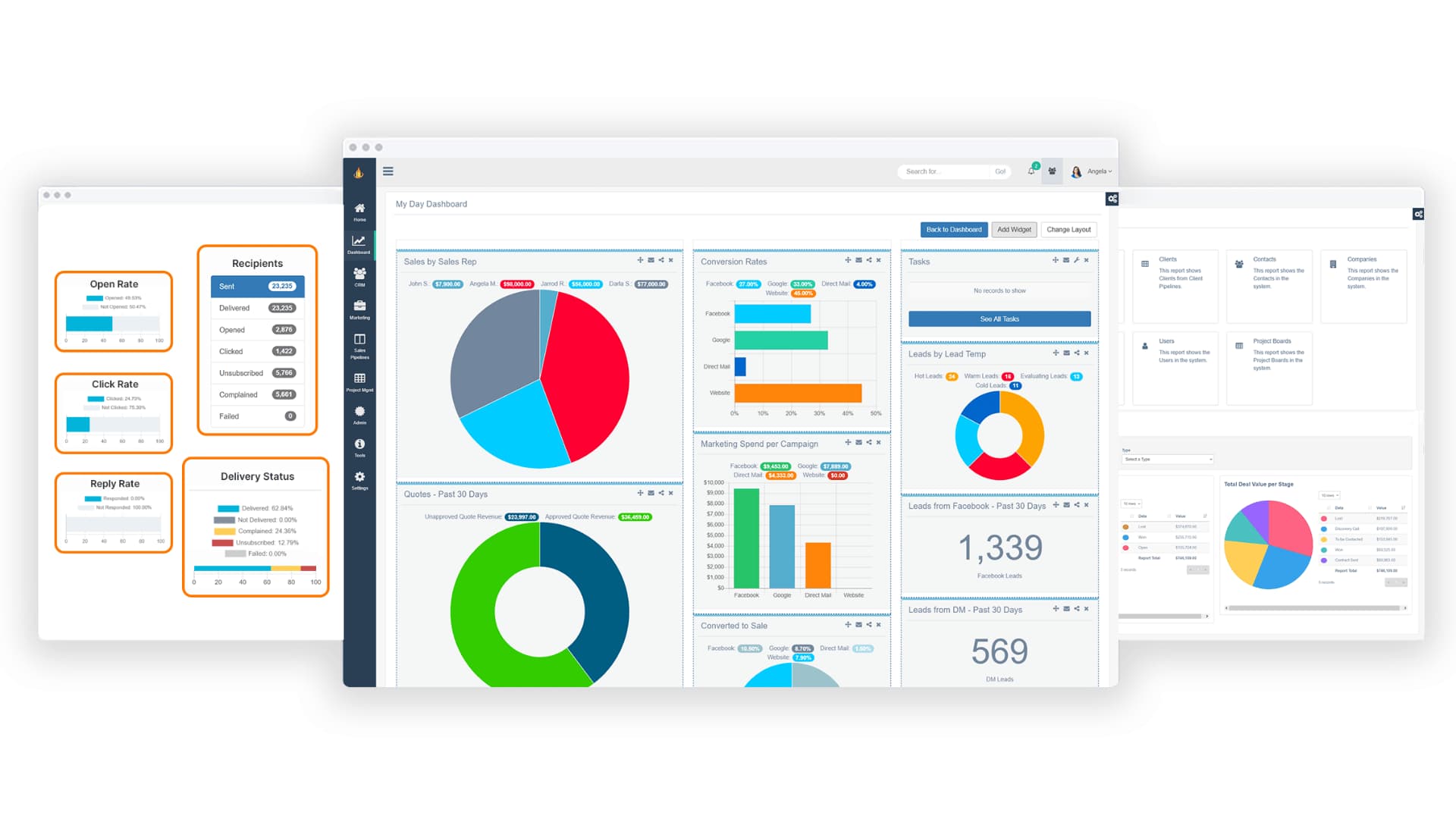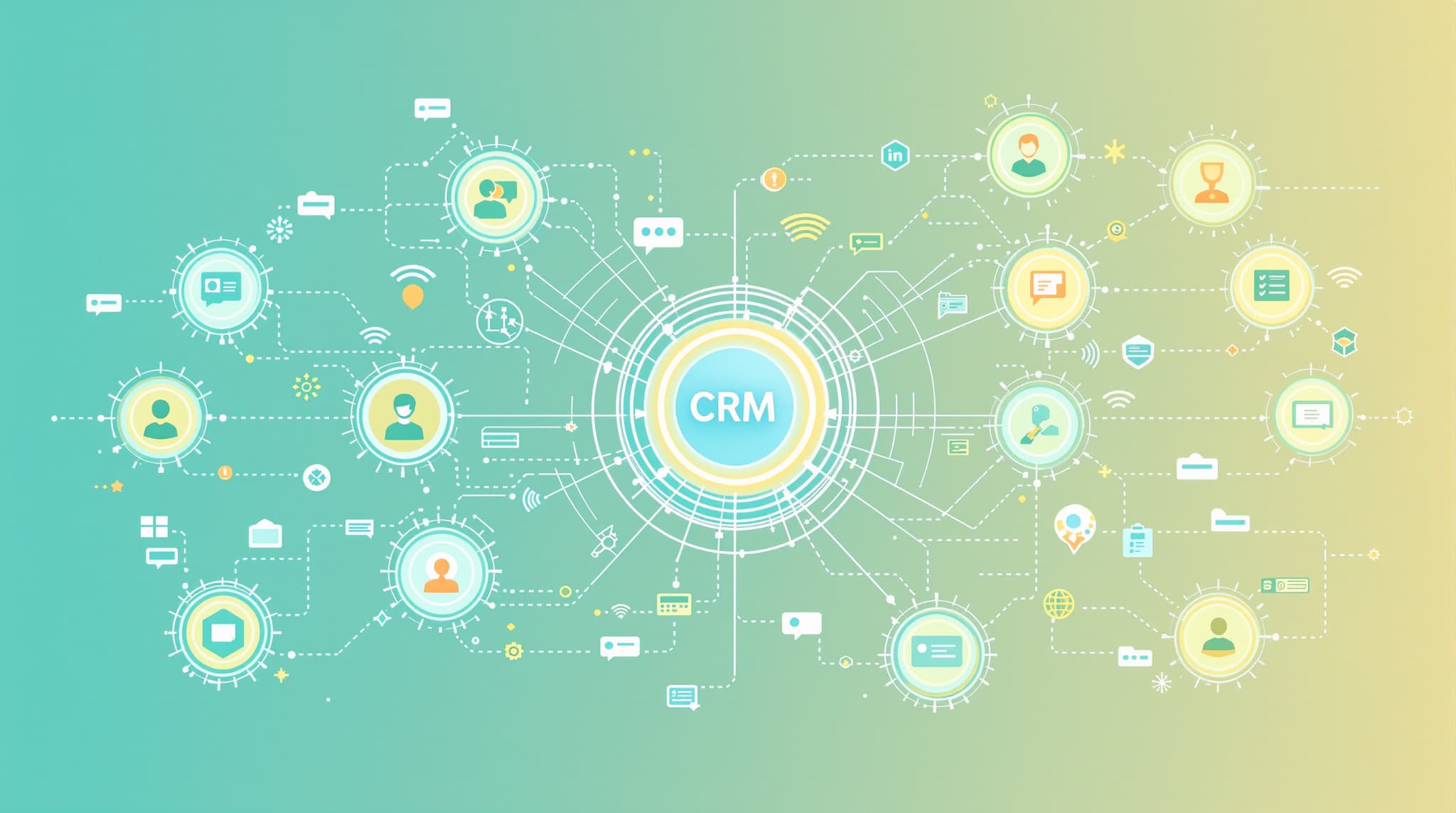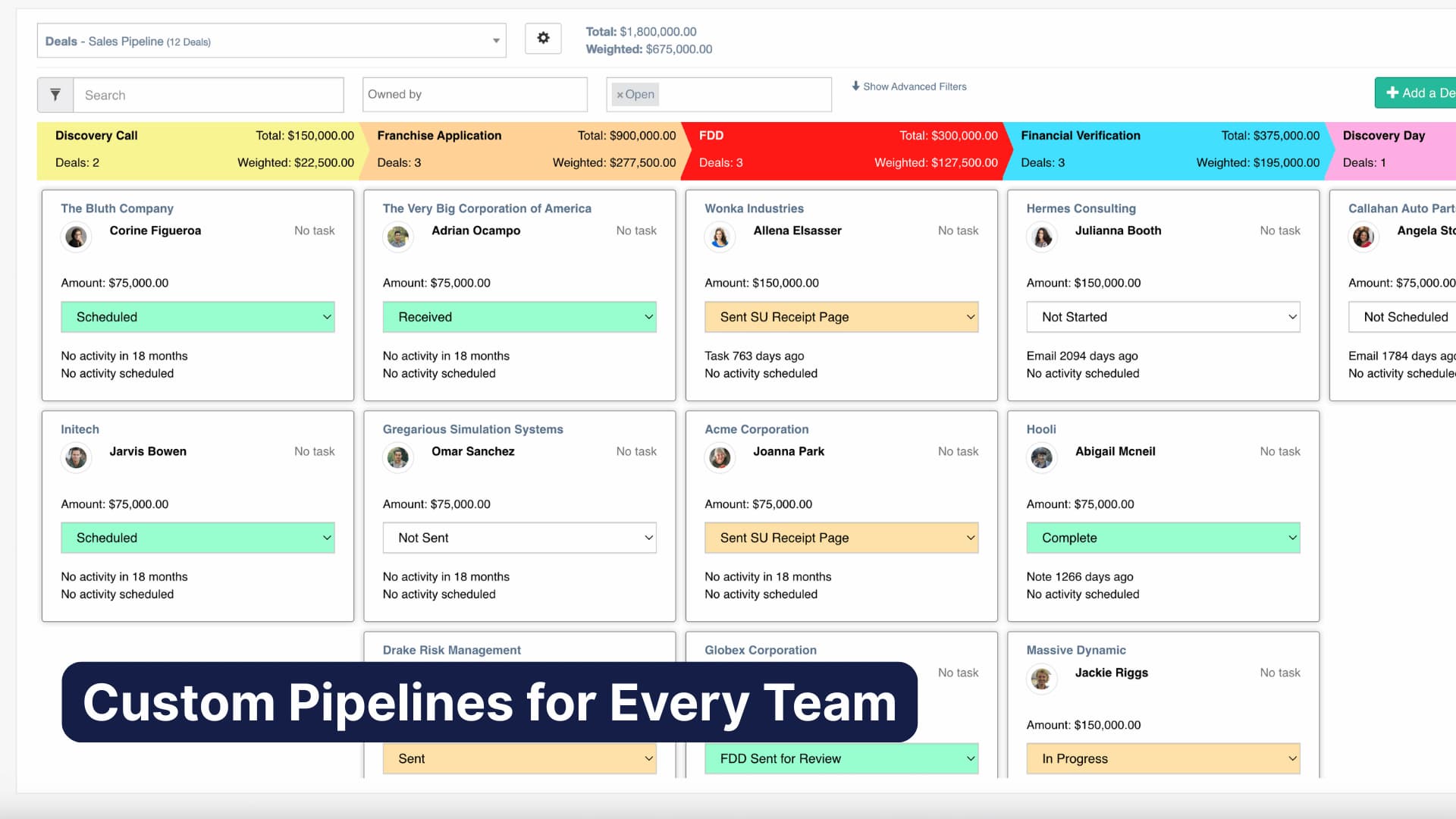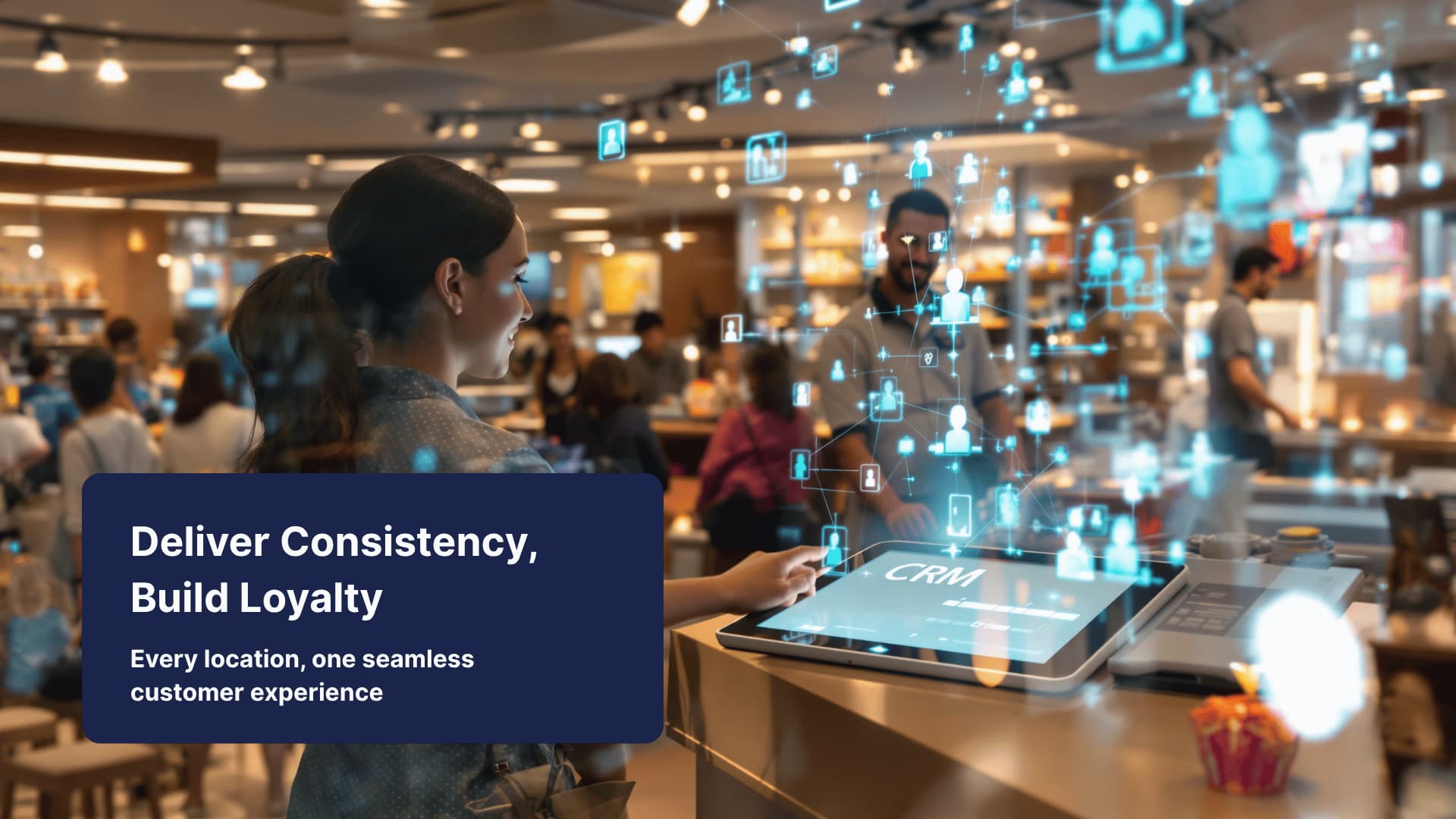10 Benefits of Franchise Management Software with CRM Integration
by

- What Is Franchise Management Software with CRM Integration?
- 1. Unified Data and Real-Time Oversight
- 2. Faster Franchise Onboarding and Training
- 3. Streamlined Communication Between Franchisors and Franchisees
- 4. Standardized Sales and Marketing Processes
- 5. Better Lead Management and Conversion Tracking
- 6. Accurate Performance Reporting and Analytics
- 7. Enhanced Customer Experience Across All Locations
- 8. Greater Efficiency Through Automation
- 9. Simplified Compliance and Data Security
- 10. A Scalable System That Grows with Your Franchise
- Bringing It All Together
- FAQs
That’s why having franchise management software connected with a CRM system isn’t just helpful, it’s essential. Together, they give you the structure and visibility to run your franchise like a single, well-coordinated operation, no matter how many locations you’re managing.
This combination doesn’t just help you manage complexity, it simplifies it. With one unified platform, franchisors can connect people, data, and processes without adding extra layers of work. You spend less time chasing information and more time leading with strategy and confidence. Over the next sections, we’ll break down 10 ways integrated franchise management and CRM software can help you streamline operations, strengthen relationships, and create a network that grows smarter and faster together.
What Is Franchise Management Software with CRM Integration?
Franchise management software helps franchisors oversee operations across multiple locations, from onboarding and performance tracking to compliance and support. Think of it as the central nervous system of a franchise, one that keeps every moving part connected and functioning smoothly. When combined with a CRM system, it extends those capabilities into customer engagement, lead management, and marketing automation, creating a complete ecosystem for both internal operations and external relationships.
In simpler terms, franchise management tools help you run the business; the CRM helps you grow it. Together, they eliminate the gaps that often slow teams down. Instead of juggling spreadsheets, emails, and manual updates, everything lives in one connected platform where progress is easy to track and performance is visible in real time.
This combination also makes daily life simpler for everyone involved:
- For franchisors, it means clear oversight of every location’s performance without micromanaging.
- For franchisees, it means instant lead distribution for new inquiries, access to pre-built templates for campaigns, and automated workflows that make daily management smoother and more predictable.
- For customers, it means a consistent experience regardless of where they interact with the brand.
In practice, this unified setup lets a regional manager spot trends instantly, such as a drop in customer response time or a spike in new leads. They can then take action immediately instead of waiting for reports. When these systems work together, every location operates under one clear, data-driven structure, not only enhancing efficiency and growth but also creating a smoother, more human experience for the people who make the franchise thrive. Now that we’ve covered how these systems work together, let’s dive into the first big advantage; unified data and real-time oversight, where the real transformation begins.
Let Us Help You Get Started!
Pulse CRM delivers more than software. We’re your partner in success.
We fully set up your CRM, including importing your data, configuring sales and marketing automations, designing branded email templates, writing engaging email copy, setting up sales pipelines, and much more.
1. Unified Data and Real-Time Oversight
One of the biggest challenges for franchisors is managing fragmented data. Every location has its own way of tracking things, spreadsheets here, software tools there, and before long, the bigger picture gets fuzzy. It’s like trying to run a marathon with your eyes half closed. Headquarters can’t see what’s really happening at each location, and that lack of visibility often slows down smart decision-making.
Now imagine all that information living in one place, one unified CRM where every number, trend, and update flows in real time. Suddenly, you don’t have to wait weeks for reports or sift through different systems. You can spot a pattern the moment it appears, whether it’s a seasonal dip in sales, a campaign outperforming expectations, or a new customer trend emerging in a specific region. This kind of visibility turns decision-making from reactive to proactive, giving franchisors the power to move faster and with more confidence.
According to McKinsey research, companies that use integrated data systems are up to 19 percent more efficient and can cut reporting errors nearly in half. When your data is accurate and accessible, every team, from marketing and finance to customer service, can do their job better. Marketers see what’s working in real time, finance can forecast more accurately, and customer service can resolve recurring issues before they grow.
If your franchise still relies on multiple tools for CRM, analytics, and reporting, integrating them under one system changes everything. Imagine this: one franchise location suddenly notices fewer customers converting. It’s the kind of dip that might go unnoticed for weeks without the right systems in place. With connected data, leadership can catch it immediately, compare it with other regions, and share what’s working in top-performing locations. Instead of waiting weeks to adjust, the fix happens in real time. That’s the beauty of unified data. It doesn’t just inform your business; it drives it forward.
| Challenge | Without Integration | With CRM Integration |
|---|---|---|
|
Data access |
Separate systems |
Unified permission driven dashboards |
|
Visibility |
Limited |
Real-time insights |
|
Decision-making |
Reactive |
Proactive |
Having unified data gives franchisors clarity and confidence in their decisions. The next logical step is to ensure new franchisees experience the same transparency from day one.

2. Faster Franchise Onboarding and Training
Once data visibility is under control, the next step is creating efficiency in how you bring new franchisees into the system. The first few weeks of onboarding often set the tone for long-term success, yet many franchises find this process messy or inconsistent. A connected CRM structure helps fix that by simplifying and standardizing every step, from sign-up to launch.
When onboarding is managed through a unified system, no one wastes time chasing documents or repeating tasks. Instead, automation takes care of the heavy lifting, allowing both franchisors and franchisees to focus on learning, growth, and relationship-building.
Here’s what that looks like in action:
- Automated reminders help ensure that every onboarding step gets completed on time, preventing tasks from slipping through the cracks.
- Smart workflows streamline the process by assigning follow-up actions automatically when milestones are missed or delayed.
- Progress notifications keep both franchisors and franchisees informed, creating accountability without extra manual work.
This kind of structure doesn’t just save time, it builds confidence. New owners know what’s expected and have support built right into the system. In fact, Training Industry](https://trainingindustry.com) found that structured onboarding can boost productivity by 70 percent and retention by over 80 percent. Those numbers reflect the real-world payoff of doing onboarding right. When new franchisees feel supported and prepared, they perform better, build stronger teams, and contribute to the franchise network faster.
It’s also worth noting how this setup improves the culture across the entire organization. When every franchisee begins with the same tools and training, there’s a shared understanding of brand standards and expectations. Everyone speaks the same operational language, which makes collaboration easier down the line. A clear, well-structured onboarding process sets the foundation for everything that follows, including better communication and trust across the network.
Building on this structure sets up the next major advantage, improving communication throughout the organization. Once onboarding is seamless, maintaining open communication becomes the foundation for consistent operations.
3. Streamlined Communication Between Franchisors and Franchisees
After streamlining onboarding, the next challenge is maintaining clear, consistent visibility into how franchisees engage with their leads and customers. When multiple locations handle communications differently, it can be hard to keep track of what’s been said, what needs follow-up, and where opportunities might slip through the cracks.
A connected CRM makes all of this easier by giving franchisors and franchisees a shared view of every customer interaction. From email conversations and call notes to scheduled follow-ups, everything is stored in one centralized place. This helps eliminate guesswork and ensures that no lead or client goes unnoticed.
Here’s how a connected CRM improves communication visibility:
- Real-time communication history lets teams instantly see past emails, text messages, and responses for each customer.
- Centralized notes make it simple to track ongoing conversations and pass context between team members.
- Automated reminders alert users to follow up with leads who haven’t responded yet.
- Performance snapshots give franchisors insight into how customer communication impacts conversion rates.
With everyone working from the same up-to-date information, franchisees can respond faster, franchisors can monitor engagement trends, and customers receive a more consistent, professional experience every time. Instead of searching through scattered inboxes or missed messages, teams can focus on building stronger relationships and keeping leads moving smoothly through the sales process.
With communication visibility streamlined, it becomes easier to align all locations around a consistent brand voice and service standards. This foundation lays the groundwork for the next big piece of the puzzle: creating consistent, scalable sales and marketing processes that keep every location in sync.

4. Standardized Sales and Marketing Processes
Every franchise operates under the same brand, yet marketing execution often varies from one location to another. CRM integration](https://thepulsespot.com/pulse-for-franchises) ensures that every team runs campaigns from the same playbook while still allowing room for local creativity.
Standardized systems share templates, workflow automations, and reporting dashboards that make it easy to measure what’s working. When everyone uses the same workflows, collaboration improves, and performance becomes more predictable.
Benefits include:
- Consistent brand messaging across all locations.
- Shared access to approved creative assets and campaign templates.
- Streamlined workflows for faster execution.
- Centralized data for campaign analysis and performance tracking.
According to Statista, more than 70 percent of consumers expect a consistent brand experience across every channel. Standardizing processes ensures your marketing reflects the same professionalism and tone everywhere, building trust with customers no matter where they interact with your brand.
The right balance between standardization and flexibility allows franchisees to personalize content for their market while staying true to the overall brand identity. That combination leads to stronger engagement and unified brand equity across the network.
Once marketing and sales efforts are aligned, the next focus is lead management, where efficiency and follow-through can make or break results.
5. Better Lead Management and Conversion Tracking
Franchise networks juggle two critical pipelines: acquiring new franchisees and helping existing ones convert leads into customers. Both are vital to growth, but without a clear system in place, opportunities can easily stall or slip away. If data lives in separate tools or follow-ups depend on memory, momentum fades, and promising leads often get lost in the shuffle.
An integrated CRM changes that dynamic by organizing, automating, and accelerating the entire process. Instead of relying on manual updates or back-and-forth emails, the system routes inquiries to the right people instantly and ensures follow-ups happen when they should. The result is faster responses, stronger engagement, and more closed deals.
With a connected CRM, franchisors can:
- Track every lead from first touch to final conversion.
- Automatically assign leads to the correct location or representative.
- Set up automated reminders so no follow-up falls through the cracks.
- Visualize conversion trends across all locations in one dashboard.
- Identify bottlenecks and refine the process before they impact performance.
What makes this powerful is the shared visibility. Franchisees can see which leads are most promising, while corporate teams can monitor patterns across the entire network. If a particular region consistently outperforms others, those practices can be documented and shared system-wide. It creates a learning loop that continually strengthens sales performance.
Lead Management Impact at a Glance
| Benefit | For Franchisors | For Franchisees |
|---|---|---|
|
Lead tracking |
Network-wide visibility |
Local accountability |
|
Nurturing |
Automation and templates |
Timely engagement |
|
Reporting |
Real-time insights |
Actionable local data |
When lead management becomes second nature, franchise teams can focus less on chasing leads and more on building relationships that convert. That level of alignment and consistency is what turns a good sales process into a scalable growth engine.
Strong lead management naturally feeds into performance reporting. When every action is tracked, insights become more powerful and measurable.

6. Accurate Performance Reporting and Analytics
Reliable performance data drives better decision-making, and when that data is visualized in real time, it transforms how franchises operate day to day. Imagine being able to open a dashboard that tells you, at a glance, which regions are thriving, where marketing is paying off, and where customer satisfaction is slipping, without chasing down reports or spreadsheets. That is what integrated CRM dashboards make possible.
By eliminating manual reporting, franchisors no longer rely on delayed updates or fragmented data from multiple sources. Everything they need is displayed in one place, offering a clear view of performance metrics across sales, marketing, and operations. The best part? These dashboards are live, meaning trends are visible as they happen, not after the fact.
With an integrated CRM, franchisors can:
- Compare regional or location-based performance instantly.
- Automate recurring reports for reliability and accuracy.
- Detect performance dips before they affect revenue.
- Track progress toward network-wide goals in real time.
- Customize dashboards so each leader sees what matters most to their role.
The simplicity of seeing everything in one place helps teams respond faster and make smarter choices. Instead of spending hours compiling data, leaders can focus on strategy, coaching underperforming locations, sharing best practices, and forecasting more effectively.
Integrated reporting also strengthens trust across the network. When franchisees see transparent, accurate data, it creates alignment and everyone works from the same facts, not assumptions. This transparency fosters collaboration, accountability, and a culture of continuous improvement.
7. Enhanced Customer Experience Across All Locations
Customer experience defines brand reputation, and consistency is key. A connected CRM ensures every interaction feels personal, relevant, and on-brand, regardless of where it happens. When customers walk into any franchise location, they shouldn’t feel like they’re starting from scratch. Their history, preferences, and past interactions should already be known and acknowledged. That is what makes a customer feel valued, not just recognized.
How it enhances experience:
- Shared customer information give franchisors full visibility into customer interactions while allowing each franchise to manage its own relationships independently.
- Unified communication history that prevents repetition and builds trust.
- Automated feedback collection and service follow-ups that make customers feel heard and appreciated.
When information moves as smoothly as the customer journey itself, every interaction feels thoughtful and cohesive. That continuity builds familiarity, which is what keeps people coming back. According to PwC’s Future of Customer Experience Survey, 73 percent of consumers consider customer experience a deciding factor in their purchase decisions. So when every branch delivers a seamless, connected experience, it becomes a competitive advantage, not just a nice-to-have.
A connected CRM gives franchisors the ability to spot trends and make proactive improvements, too. If feedback at one location highlights an emerging issue, training can be adjusted before it spreads. Similarly, when customers rave about a particular service touchpoint, that success can be replicated system-wide. These small, ongoing improvements compound over time, creating a cycle of learning and excellence.

8. Greater Efficiency Through Automation
Manual, repetitive tasks slow down franchise operations, draining time that could be better spent on strategy, innovation, and customer experience. Automation steps in as the quiet hero, handling those repetitive processes in the background so your teams can focus on what actually drives growth.
Think about all the small tasks that eat up hours every week, follow-up emails, report generation, data entry, or scheduling. These are important but rarely require human creativity. That is where automation shines. By letting your systems handle the repetitive work, you free up your people to focus on big-picture thinking and more meaningful connections.
Automation can handle:
- Routine follow-ups and notifications to keep leads warm without manual input.
- Scheduling reminders, renewals, and appointment confirmations.
- Report generation and data-sharing that updates automatically.
- Task assignments that prevent bottlenecks.
- Trigger-based campaigns that respond instantly to customer behavior.
Automation isn’t about removing the human element, it’s about giving people the bandwidth to be more human. Teams can focus on creative strategy, thoughtful communication, and proactive problem-solving instead of chasing repetitive tasks.
Franchisors benefit from increased consistency and visibility, while franchisees get more time to nurture customers and refine their approach. According to Forrester, workflow automation can reduce operational costs by up to 30 percent, and those savings can be reinvested in staff development or customer initiatives.
The best results come from balance. Automation should amplify human productivity, not replace it. When thoughtfully implemented, it gives franchises the freedom to scale faster, with fewer errors, and with more time to deliver personal, genuine experiences that keep customers coming back.
Efficiency and automation introduce scale, but with scale comes responsibility, particularly around compliance and data protection.
9. Simplified Compliance and Data Security
Managing compliance and data privacy is one of those behind the scenes essentials that keeps a franchise running smoothly and safely. For multi-location organizations, even one oversight can have major ripple effects. That’s why a unified CRM system does more than store customer data. It actively protects it. By embedding security policies and consistent processes into daily operations, it ensures every franchise location follows the same standards with minimal effort.
Key advantages:
- Role-based access controls ensure that only authorized team members can view specific data.
- Audit trails for full transparency and accountability during reviews.
- Automatic updates that keep every system aligned with evolving compliance regulations.
- Centralized monitoring so franchisors can track security activity across all locations.
This consistency gives franchisors peace of mind and customers confidence that their information is handled responsibly. It also saves time by reducing the manual work required for individual compliance checks. Instead of piecing together multiple systems or chasing documents, franchisors can run one centralized audit and instantly spot issues before they escalate.
According to IBM Security, the average cost of a data breach in 2023 exceeded $4.45 million, a reminder of just how costly even small mistakes can be. A standardized CRM reduces that risk by ensuring every location adheres to the same data-handling practices, no matter where they operate.
When franchisees understand that security is not just a policy but a promise to customers, compliance becomes effortless. They take ownership of it because the system makes it easy. Over time, security evolves from a checklist item into part of the brand’s culture, protecting not only the data but also the trust that keeps customers coming back.
Once compliance is streamlined and secure, franchises can confidently scale knowing the system can handle growth.

10. A Scalable System That Grows with Your Franchise
Growth brings complexity, but scalability turns it into opportunity. A CRM-enabled franchise management system grows with your business, adjusting seamlessly as new locations come on board without losing speed or visibility. Instead of reinventing workflows every time you expand, your system becomes the playbook that ensures consistency and alignment from day one.
Scalable system benefits:
- Standardized templates that make onboarding new locations fast and consistent.
- Shared automations that grow with demand, so no process gets bottlenecked as volume increases.
- Central dashboards that give leadership clear oversight, no matter how many locations join the network.
- Flexible data structures that allow you to adapt to market shifts or regional differences.
- Integrated reporting tools that scale with complexity while maintaining simplicity for end users.
When scalability is built into your CRM, adding a new franchise is not a disruption, it is a natural extension of your growth strategy. Every location plugs into the same ecosystem, using proven frameworks that already work. This ensures training, customer data, and workflows are immediately standardized across the board.
A scalable setup also means your technology won’t limit your vision. Whether you grow from five to fifty locations or enter new markets, your system can handle the load without losing performance or creating data silos. Leadership gains instant visibility across all regions, while franchisees benefit from ready-to-use tools that make operations smoother from day one.
How CRM Integration Simplifies Growth
| Growth Challenge | Without Scalability | With CRM Integration |
|---|---|---|
|
Adding locations |
Manual setup and inconsistencies |
Quick setup using templates |
|
Managing workflows |
Bottlenecks as volume grows |
Processes expand automatically |
|
Reporting accuracy |
Fragmented data |
Centralized real-time insights |
Gartner research shows that scalable digital systems improve long-term profitability by 35 percent. For franchises, that means every new location can launch faster, operate more efficiently, and grow within a proven, sustainable framework.
Let Us Help You Get Started!
Pulse CRM delivers more than software. We’re your partner in success.
We fully set up your CRM, including importing your data, configuring sales and marketing automations, designing branded email templates, writing engaging email copy, setting up sales pipelines, and much more.
Bringing It All Together
When CRM and franchise management platforms operate in sync, they unlock scalability, transparency, and smarter decision-making. Data becomes actionable, communication strengthens, and automation frees teams to focus on high-value work.
If you’re ready to streamline operations and strengthen your franchise network, start by identifying where disconnections exist today. Then, explore how integration can bridge those gaps to create a smoother, more connected, and profitable system.
Book a live demo today to see how a unified CRM and franchise management solution can help your network grow stronger, faster, and more efficiently.
FAQs
Integration eliminates data silos and creates one unified view of operations, improving oversight, communication, and decision-making. This matters because many franchises struggle with disconnected tools that make collaboration difficult. When everything is connected, teams can act on real-time insights instead of reacting to outdated data. For example, if one location sees a spike in sales from a new campaign, franchisors can instantly replicate that strategy across the network.
Yes. Even small franchise networks gain efficiency, improved onboarding, and better customer insights through integration. It helps early-stage businesses establish strong processes from the beginning, preventing growing pains later. A smaller franchise, for instance, can use automation to manage customer follow-ups or onboarding tasks with limited staff, saving time and ensuring professionalism at every step.
With proper setup and support, integration is straightforward and scalable. The key is mapping out workflows before implementation, so the system mirrors how your business actually operates. Pulse CRM’s flexible architecture, for example, lets franchises connect tools like email, reporting, and automation without needing heavy IT involvement. Once implemented, most teams find they can manage daily operations far more efficiently.
Absolutely. A franchise CRM with centralized communication makes it easy for teams to deliver consistent, personalized experiences that improve satisfaction and loyalty. When a customer makes a repeat purchase, staff can instantly see their previous orders, communication history, and preferences. This allows them to tailor recommendations, anticipate needs, and provide a more seamless experience that feels personal and thoughtful. Over time, that kind of service builds trust and encourages repeat visits, turning casual buyers into loyal advocates.


